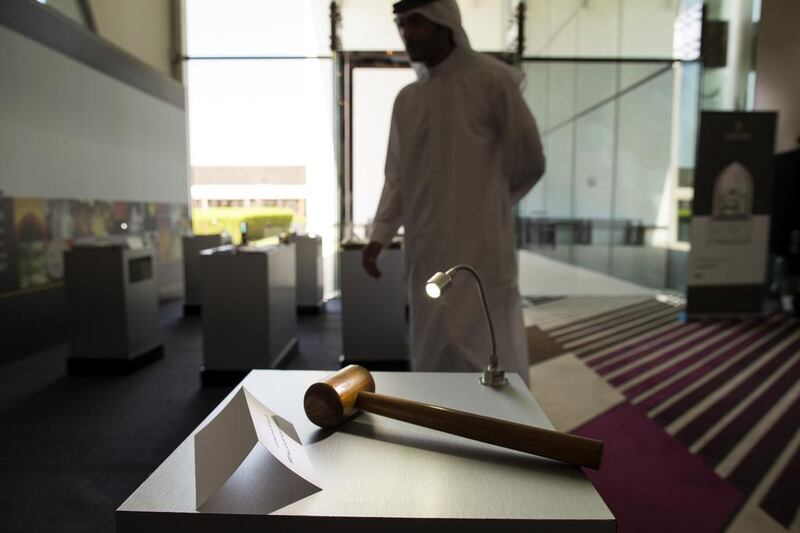ABU DHABI // The Supreme Court aims to begin its fifth decade with more young Emirati judges and judicial and financial independence.
The changes are at the heart of a draft judicial authority law that will make the court more independent of the Ministry of Justice.
They will permit the appointment of young Emirati judges and judicial staff based on their qualifications and abilities rather than their age and experience.
“There are young local judges with high qualifications,” Dr Abdul Wahab Abdul, the chief justice, said at the Union Supreme Court’s 40th anniversary celebration on Monday. “Focusing on seniority does not always bring out the best.”
Restrictions based on age and experience were hindering the Emiratisation process, he said, but the new law would speed it up.
While public prosecution has achieved 99 per cent Emiratisation, only four of 20 supreme court judges are Emirati.
Shehab Al Hammadi, chief justice of the commercial courts, said this was a good percentage compared with other courts.
The court is also looking forward to having its own budget, separate from the Ministry of Justice.
The new law will identify the specialities of the court as the highest judicial authority.
Dr Abdul said the Union Supreme Court should stop hearing cases that were “far from its specialities and duties” and reassign them to other courts. He used employee discipline, immigration and residency offences as examples.
“I am looking forward to crossing the fifth decade with a new breath,” he said. “Forty years have passed on the current law and it needs to be renewed.”
More judicial independence is also targeted in the new law. It would free the judiciary from interference by ministries and external agencies.
Monday’s celebration began with a short film featuring Sayed Ali Al Hashemi, one of the founders of the justice system, who highlighted the court’s main achievements – first place in the Arab world and Mena region for judicial transparency, and 13th place worldwide in 2011.
He recalled how the late Sheikh Zayed, founder of the nation, always stressed that no one was above the law and in a trial there was no difference between the rights of a UAE national and those of an expatriate resident.
The USC adjudicates cases that concern the emirates as a whole, such as disputes between emirates, conflicts of jurisdiction between different courts over certain cases, the constitutionality of federal laws and the accountability of ministers, judges and top officials.
The state security court also falls under the USC. It handles cases that affect national stability, forged passports, stamps and currencies.
The USC became active on August 2, 1973, when Federal Law No 10 for that year was activated. It issued its first verdict on November 29, on a constitutional dispute.
“The number 40 has a special place in the Arab thought as a sign of persistent strength, perfection of mind and intellectual maturity,” Dr Abdul said.
He described the developments of the past four decades. From 1973 to 1983 there were no basic laws, and the court had to find solutions using sharia. In the second decade, the court offered a unified definition of current laws.
In the third decade, the first generation of Emirati judges joined the court. Over the past 10 years, the court has focused on explaining new laws to make sure all concerned parties share the same understanding. These laws cover crimes involving information technology and electronic trading.
The ceremony honoured the first generation of Emirati chief justices, judges and prosecutors.
Among them was Falah Al Hajeri, chief justice of the state security and personal affairs courts, who recently handled the trial of 94 Emiratis accused of sedition.
Mr Al Hajeri said amendments to state security, criminal and family laws were under study. “Not that they are insufficient,” he said, “but laws are always open to upgrades.”
hdajani@thenational.ae







